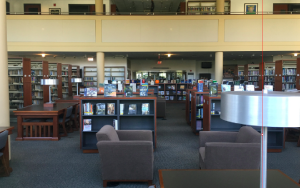Jillian Rotman ’18, Simon Smerconish ’19:
Libraries are the purest form of education we have. Want to learn about something not covered in class? Check for a book from the library. Have a research paper due? Cite a book from the reference section. It seems that you can’t have a school without a library, but during the summer of 2014 at Malvern Prep, the library was transformed into a communal space. Though the decision was likely thought through and approved by students and administrators, removing a library takes away the easy access of materials that some students rely on.
Understandably, it is likely that many students would support the removal of a traditional library. Learning has become more technology based, and some people do not have time in academically and athletically rigorous schedules to pick up a book for pleasure. Many students only use the library for research projects. A central location to socialize and work would perhaps be what students would prefer and be eager to utilize more often, and certainly has its benefits. Dan Waterland, a senior at Malvern tells us that the learning commons is “a place I can go any time of the day to do homework, study for a test, or just socialize with friends.” This being said, whatever may be gained in efficiency by streamlining information consumption will pail in comparison to the lost educational opportunities which stemmed from the momentary curiosity provoked by a walk through the library. The library and the classroom have long competed as models of the ideal ways in which to impart knowledge. A balance between the two, structure and curiosity, is recognized as essential for the cultivation of the disciplined and eager mind. The benefits of a central “learning commons” simply cannot outweigh the value of a library.
There is one question that remains: is it right to remove a library, a location so integral to a school’s vision? Doug Borgerson, an EA teacher, coach and Malvern Alum points out the discrepancy between Malvern’s new “learning commons” and a certain statue on campus. “When you drive onto the Malvern Prep campus there’s a statue with a phrase written in Latin. Its message has to do with reading. There’s a clear juxtaposition between the statue and now, a lack of a library.” Though the classroom model has become increasingly dominant and curriculums rigid, especially in the case of AP classes, the library, indicative of the purest motives for the accumulation of knowledge must be safeguarded in order for those better suited for self structured learning to have a school supported environment.
It is important not to mistake the approaching question of the necessity of the library as the beginning of an inevitable technological transition, but instead as a critical transformation to an educational methodology that encourages uniformity and destroys creativity. Plato once said “necessity is the mother of invention,” but in a world whose greatest problems are not those whose urgency is easily apparent or immediately able to be remedied by simple or generic solutions, we can not as a school, state, nation, or species allow a person’s intellectual capacity to be hindered by neglecting their curiosity.
A sister philosophy, summarized in junior Hope Biddle’s mantra “less school more learning” is at the heart of J-term and the Global Online Academy, to mention a few of the curiosity based academic initiatives Episcopal has undertaken in the recent past. Though as a library staff member reminds us not only do libraries inspire curiosity in those who utilize them, but “since their conception… (Libraries) have always been symbols of human progress and innovation with a eye towards communal betterment ”

Photo Courtesy: Aantorik Ganguly
Balancing new technologies and time honored methods of learning is but one of the many conundrums facing the education system today. Moving forward as a school we must more consciously and consistently strike a balance between structure and curiosity, with the understanding that the neglect and subsequent overindulgence of one or the other could have perilous effects on the mind and inevitably the shape of unbalanced institutions. We cannot follow Malvern’s Path and need to keep the Annenberg Library here at EA.